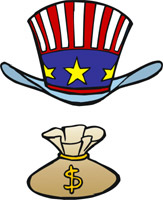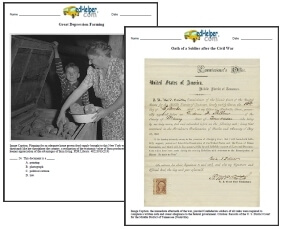By Brenda B. Covert

|
The Wonderful World of Taxes
By Brenda B. Covert |

|
 1 Ah, the wonderful world of taxes. Wait a minute! Does anyone believe that taxes are wonderful? Well, yes and no. No one really likes to be taxed, but nearly everyone agrees that taxes are important. What is a tax?
1 Ah, the wonderful world of taxes. Wait a minute! Does anyone believe that taxes are wonderful? Well, yes and no. No one really likes to be taxed, but nearly everyone agrees that taxes are important. What is a tax? |
Create Weekly Reading Books
Prepare for an entire week at once! |
 |
The 1890's
|
 |
Election 2004: United States Elections
|
 |
Election 2008: United States Elections
|
 |
United States
|
|
|
 | Fifty States Theme Unit |
 |
Document Based Activities |